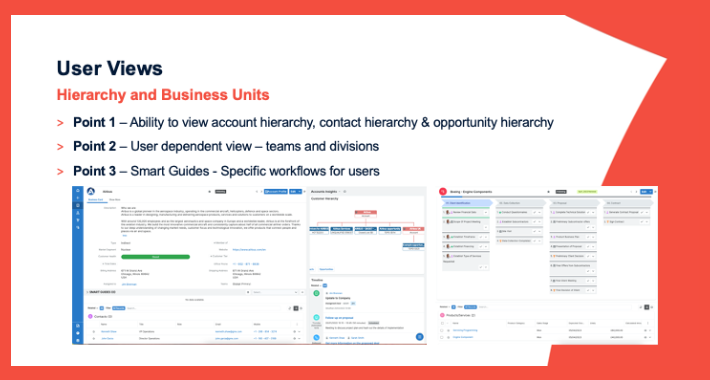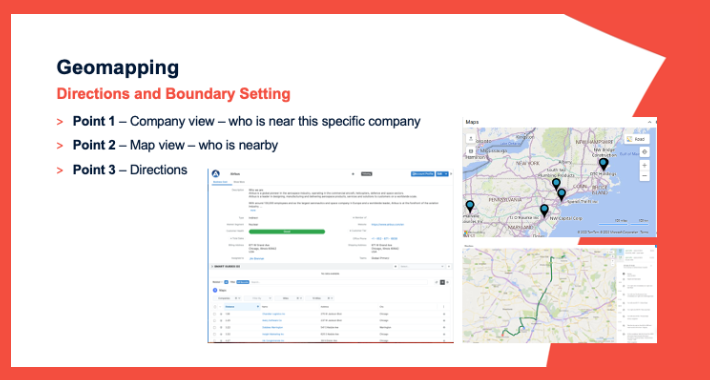
Are you looking to improve how your company manages customer interactions and maintains detailed records? We understand how important it is for aviation professionals to keep up with the latest technology trends and solutions to remain competitive. During our recent Q&A session, participants had the opportunity to ask questions about CRM systems and their capabilities.
Sara Tatam, Senior Sales Executive at Provident CRM, and George Walker, Regional Sales Executive at SugarCRM shared their insights and expertise working with aviation and aerospace companies, focusing on Sales, Service and Marketing requirements. Here, they’ll walk us through a few scenarios and address some commonly asked questions from aviation professionals researching for CRM solutions.
Absolutely! With a CRM like Sugar, you can centralise all customer communications into one view, whether it’s the record view of an account or contact. This includes call notes, call history, and email history, which can be archived through Outlook or Gmail integration. By consolidating all customer interactions in one place, SugarCRM ensures that anyone who needs access to this information can retrieve it quickly and easily. This streamlined approach enhances the customer experience by eliminating gaps in data transfer and enabling efficient communication across different touchpoints.
A good CRM offers robust functionality to manage sales pipelines and forecasting across various divisions within your organisation. By utilising the “Teams” feature, you can create separate teams for each department. Within the Opportunities and Forecasting module, you can establish monthly or quarterly quotas per division. This allows you to track the overall team quota as well as individual progress toward meeting their targets. SugarCRM also provides comprehensive reporting capabilities, enabling you to monitor opportunities, leads, and forecasted sales. Additionally, you can leverage the data collected during the opportunity and forecasting process to optimise resource management, manufacturing timelines, and procurement decisions.
The flexibility of your CRM is a key advantage when it comes to marketing and customer segmentation. The system allows you to create and customise fields within customer records, including dropdowns, multi-selects, and text fields. This versatility empowers you to gather valuable data such as customer interests and purchase history. Leveraging these data points, you can segment your customer base and create targeted lists for marketing initiatives. This detailed level of segmentation enables your marketing team to deliver more personalised and effective campaigns. Importantly, SugarCRM ensures that this wealth of information is easily accessible without cluttering the main user interface.
SugarCRM provides extensive reporting capabilities that enable you to generate reports, identify areas for improvement, and make data-driven decisions. Every field within the system can be reported on, allowing you to extract meaningful insights. You can export data, create visual representations like pie charts and graphs, and build lists and segments based on specific criteria. Whether you want to track customer preferences, purchase history, competitors, or contract expiration dates, SugarCRM’s customisable reporting features have you covered. By analysing these reports, you can identify patterns, trends, and areas for improvement, helping you refine your strategies and optimise your operations.
Integrating a CRM system with existing software is typically a seamless process, and SugarCRM provides several options for integration. It is common for CRM integration to involve Enterprise Resource Planning (ERP) systems. For instance, the lead-to-opportunity-to-sale process often requires integration with ERP systems to manage tasks like sales order processing, manufacturing time, and delivery. SugarCRM allows you to incorporate these milestones into the CRM, ensuring that relevant information is readily available to customer representatives. Sugar offers an open REST API, which is fully documented on their website, making integration with various software applications straightforward. Additionally, SugarCRM supports native plugins for some software applications, and for cases where APIs are unavailable, direct database integrations can be performed securely. The flexibility and compatibility of SugarCRM allow for smooth integration with 95% of the software applications that customers commonly request.
CRM systems have become indispensable tools for businesses across various industries, offering numerous benefits to improve customer relationships and internal processes. Next, Sara and George discussed key scenarios where CRM, specifically SugarCRM, excels. Additionally, they highlighted the emphasis on data security within SugarCRM, demonstrating its commitment to safeguarding sensitive information. By leveraging the power of CRM, businesses can optimise their operations, enhance customer satisfaction, and drive growth in today’s competitive market.
Many aviation and aerospace companies operate within chains of interconnected companies, and understanding the relationships between them is crucial. Additionally, there’s a need to view the contact structure and identify any open opportunities within these hierarchies.

To illustrate this, let’s take a look at a specific example. We’ll examine Airbus, a prominent parent company, and its child company, Airbus UK. By using our dashlet feature, you can easily navigate between contacts, opportunities, and companies. This allows you to visualise the relationships within larger groups of companies and access vital information such as opportunities at both the parent and child company levels.
One common concern businesses have is managing user-dependent views within a CRM system. In many organisations, multiple departments or divisions work with different components and require access to relevant information specific to their roles. SugarCRM addresses this challenge by allowing customisation of views to ensure that users only see the information that is relevant to them. By tailoring views and utilising dependency fields, where certain data fields appear or disappear based on user selections, CRM can create a more personalised user journey and improve efficiency.
Maintaining consistency across various processes is vital for any organisation. SugarCRM offers a feature called Smart Guides, which can be used in different scenarios such as onboarding new customers, managing leads, opportunity processes, or customer service workflows. Smart Guides enable businesses to define steps, milestones, and tasks that need to be completed, ensuring a consistent approach throughout the company. This visual and customisable tool enhances the customer journey, aligns with internal processes, and fosters improved collaboration across teams.

For industries where frequent on-site visits to customers are required, efficient route planning can significantly enhance productivity and reduce costs. SugarCRM integrates with mapping services like Bing Maps to provide geomapping capabilities. Users can view a list or map of nearby customers or prospects, helping them optimise their travel schedules and visit multiple locations in a single trip. The ability to plan routes, share data via email, and download maps as PDFs offers added convenience. Moreover, the availability of these features on mobile apps enables users to access information and plan routes while on the go.
Data security is a top priority for businesses, especially when dealing with sensitive customer information. SugarCRM addresses these concerns by being hosted on Amazon Web Services, ensuring compliance with GDPR regulations. The platform provides complete control over user access, role-based access controls, and field-level restrictions. SugarCRM supports third-party identity solutions, multi-factor authentication, and encrypts data at rest using AES 256 encryption. These robust security measures instill confidence in organisations, particularly in highly regulated industries like aerospace and healthcare.
From managing customer communications to streamlining sales pipelines, enhancing marketing efforts, and generating comprehensive reports, CRM systems offer powerful tools for businesses across various industries. If you have further questions or specific scenarios you’d like to discuss, book a call with our CRM experts who are here to provide guidance, address your concerns, and help you make the most of CRM technology. Don’t hesitate to reach out and take advantage of our expertise.
Infographic download
Learn more about how a CRM solution can benefit aviation businesses, the key advantages of implementing a CRM tailored to the industry, along with signs that indicate it is time for your company to adopt a CRM system. Gain valuable insights into how a CRM can transform your operations and elevate customer relationships – click below to download our infographic and take the first step towards optimising your processes with a digital solution that grows with your business.